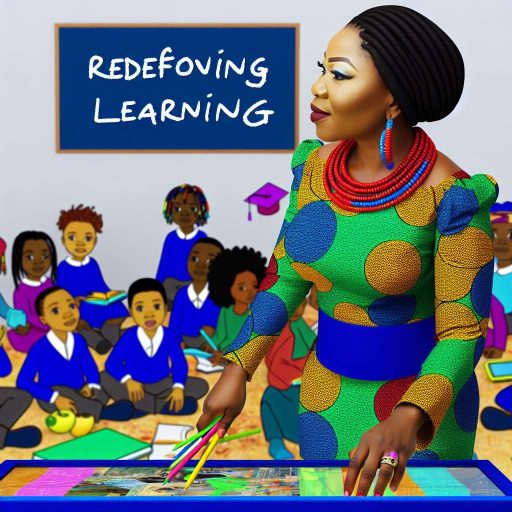Introduction
How digital learning can change the landscape of education system reveals the numerous challenges facing Nigeria’s education system.
Inadequate infrastructure hampers effective learning experiences.
Many schools lack access to essential resources.
Class sizes often exceed acceptable limits, reducing individual attention.
Digital learning emerges as a powerful tool in contemporary education.
Online platforms provide flexible, inclusive, and engaging learning environments.
Students can access a wealth of resources beyond their physical classrooms.
This transformation is crucial for Nigeria’s educational landscape.
Digital learning can bridge resource gaps and enhance teaching methodologies.
It can make education more accessible, equitable, and relevant to today’s world.
The Current Challenges Facing Nigeria’s Education System
Nigeria’s education system struggles with several critical challenges.
These issues hinder the country’s ability to provide quality education to all its citizens.
Addressing these challenges is not just necessary; it is imperative for the nation’s future.
Below, we explore the key challenges that plague Nigeria’s educational landscape.
Inadequate Infrastructure
Nigeria’s educational infrastructure remains woefully inadequate.
Many schools lack basic facilities such as classrooms, libraries, and science laboratories.
In rural areas, some students study under trees due to the absence of physical structures.
According to recent reports, over 60% of primary schools operate without proper classrooms.
Moreover, essential resources like electricity and running water are scarce.
Schools in urban regions may fare better, yet many still grapple with poor maintenance and overcrowding.
This situation leads to a learning environment that distracts students and affects their engagement.
Limited Access to Quality Resources
The challenge of accessing quality educational resources significantly impacts learning outcomes.
Many schools in Nigeria do not have textbooks or learning materials that align with the current curriculum.
This lack creates significant gaps in students’ understanding of key concepts.
According to a UNESCO report, a staggering 40% of students in Nigeria lack access to relevant educational materials.
These disparities extend to digital resources, as many schools fail to have computers or internet access.
This limits students’ exposure to valuable information and hinders their ability to engage with modern educational tools.
High Teacher-Student Ratios
The teacher-student ratio in Nigeria presents another formidable challenge.
The overwhelming number of students per teacher strains the quality of education.
In many cases, one teacher is responsible for over 50 students in a single class.
This ratio makes it difficult for teachers to provide personalized attention.
As a result, students may disengage from the learning process, leading to poor academic performance.
Furthermore, teachers often become overwhelmed and unable to address the diverse needs of their students effectively.
Impact of Socioeconomic Factors
In urban areas, poverty leads to a higher dropout rate due to financial instability.
In rural regions, children may need to help their families with farming or trading, sacrificing their education.
The lack of access to financial support compounds the issue.
Statistics Reflecting Learning Gaps
Statistical data reflects significant disparities in educational outcomes across Nigeria’s diverse regions.
According to national surveys, students in the northern states consistently underperform compared to their peers in southern states.
- Approximately 70% of students in northern Nigeria cannot read simple sentences.
- Only 55% of children complete primary school in the northern regions.
- In comparison, southern states boast completion rates over 82%.
These statistics signal a pressing need for intervention.
The gaps in learning outcomes reveal systemic issues that require urgent attention.
Improving education in Nigeria demands a collective effort focused on reducing these disparities.
The Role of Societal Attitudes
Another challenge lies in societal attitudes toward education.
Many communities prioritize traditional roles over formal education, particularly for girls.
This cultural perspective deepens the gender gap in educational attainment.
Girls often receive less encouragement to pursue education beyond primary school.
This includes facing early marriage or domestic responsibilities that limit their educational opportunities.
Changing these attitudes requires collaboration among community leaders and stakeholders.
The Impact of Government Policy
Government policies play a critical role in shaping the educational landscape.
However, inconsistent policies and lack of implementation hamper progress.
Education funding often fails to reach the intended schools and programs.
Many educational reforms remain unaddressed due to bureaucratic delays.
Consequently, teachers often find themselves unsupported, lacking training and resources.
This inconsistency undermines the quality of education nationwide.
In fact, Nigeria’s education system faces numerous challenges that require immediate action.
Inadequate infrastructure, limited resources, high teacher-student ratios, and socioeconomic factors converge to limit educational access and quality.
Statistics reveal the urgent need for intervention across various regions.
Societal attitudes and government policies further complicate the landscape.
Addressing these issues is essential for ensuring that every child in Nigeria receives a quality education.
Only then can we begin to change the narrative.
A focused approach involving technology and innovative solutions can pave the way for a brighter educational future.
What is Digital Learning?
Digital learning represents a transformative approach to education.
It uses technology to enhance teaching and learning experiences.
This method is diverse and incorporates various techniques and tools.
Below, we discuss the definition and types of digital learning.
Definition and Types of Digital Learning
Digital learning can be defined as any type of instructional practice that integrates technology.
Learning happens in a digital environment, which can be synchronized or asynchronous.
Here are some primary types of digital learning:
- E-learning: This type of learning focuses on electronic media.
It allows students to access content anytime and anywhere.
E-learning formats can range from simple presentations to more complex interactive simulations. - Blended Learning: Blended learning combines traditional classroom methods with online delivery.
This approach provides flexibility and encourages student engagement.
It allows learners to complete tasks at their own pace. - Online Courses: Online courses offer comprehensive and structured learning experiences.
They often include video lectures, quizzes, and discussion forums.
Students can earn certifications or even degrees through online courses.
Overview of Tools and Technologies Used in Digital Education
Technology has made substantial progress in education.
Various tools and platforms have emerged to support digital learning.
Below are some notable technologies used in this landscape:
- Learning Management Systems (LMS): These platforms organize and manage academic coursework.
They facilitate content delivery, assessment management, and progress tracking.
Popular examples include Moodle and Blackboard. - Educational Apps: Several applications assist both teachers and students.
They offer innovative learning experiences through interactive activities.
Some examples are Duolingo for language learning and Khan Academy for diverse subjects. - Virtual Reality (VR) and Augmented Reality (AR): These technologies create immersive learning environments.
They help students visualize concepts and improve retention.
For example, VR can simulate historical events or scientific experiments. - Video Conferencing Tools: These tools enable real-time interaction and collaboration.
Platforms like Zoom and Microsoft Teams allow teachers and students to connect virtually.
They are especially helpful in remote learning situations.
Global Digital Learning Trends
Worldwide, digital learning is evolving rapidly.
Schools and institutions are adapting to new trends to keep up.
Understanding these trends can inform Nigeria’s education system.
Here are some significant global trends:
- Personalized Learning: Tailoring the learning experience to individual needs empowers students.
Through data analytics, educators can customize content and pace.
This approach promotes learner autonomy and motivation. - Gamification: Using game elements in education makes learning fun.
It incorporates challenges, rewards, and competition.
This method encourages participation and retention of information. - Microlearning: This approach delivers content in small, focused segments.
It suits learners’ often busy lifestyles.
Microlearning increases engagement and allows for on-the-go learning. - Collaborative Learning: Technology facilitates collaboration among students.
Virtual group projects and discussion forums enhance peer interaction.
This fosters critical thinking and teamwork skills. - Open Educational Resources (OER): OER provides free access to quality educational materials.
Educational institutions and educators use these resources.
This trend promotes inclusivity and improves educational equity.
Adopting these trends in Nigeria’s education system can yield substantial benefits.
Tailoring the implementation to local contexts will maximize effectiveness.
Educators can embrace innovative teaching methods while promoting digital literacy among students.
In short, digital learning encompasses various forms and technologies that can revolutionize education.
Understanding its types, tools, and global trends can provide a roadmap for Nigeria’s educational transformation.
The continued integration of digital learning practices can cultivate a more inclusive and effective educational environment.
Read: High-Demand Educational Disciplines Shaping Nigeria’s Future
Benefits of Digital Learning in Nigeria
In Nigeria, digital learning is transforming the educational landscape.
It offers numerous benefits that can significantly enhance the quality of education.
The transition towards digital platforms caters to the unique challenges existing in the traditional educational setup.
Let’s explore the key advantages of digital learning for students, teachers, and the broader educational ecosystem in Nigeria.
Enhanced Access to Educational Resources for Students in Remote Areas
One of the most significant advantages of digital learning is its ability to reach students in remote areas.
Traditional schools often face challenges such as lack of resources, inadequate facilities, and minimal qualified teachers.
Digital learning can address these issues effectively.
- Students in the most isolated communities can access high-quality educational content online.
They no longer have to travel long distances to attend school. - Digital resources provide a wealth of information that enhances the learning experience.
Students can explore various subjects beyond the standard curriculum. - Online libraries and educational websites make learning materials available to anyone with internet access.
This includes e-books, research articles, and multimedia content. - Students can participate in virtual classrooms regardless of their physical location.
This inclusivity opens doors to many who previously faced educational barriers.
Flexibility in Learning Pace and Style
Another key benefit of digital learning lies in its flexibility.
This adaptability is crucial in catering to the diverse learning needs of students across Nigeria.
- Students can learn at their own pace.
This prevents some learners from feeling rushed while allowing advanced learners to progress faster. - Digital platforms often offer various formats, including videos, podcasts, and quizzes.
These options accommodate different learning preferences. - Students with special educational needs benefit from digital learning tools tailored to their individual requirements.
This creates a more inclusive educational environment. - Educators can personalize learning experiences based on student data collected from online assessments.
This targeted approach fosters better learning outcomes.
Opportunities for Professional Development and Training for Educators
Digital learning not only benefits students but also provides ample opportunities for educators.
Personalized development for teachers is essential for improving the overall education system.
- Online courses empower teachers to upgrade their skills and knowledge.
They can stay current with educational trends and technologies. - Virtual workshops and webinars offer networking opportunities with other educators.
This collaboration fosters a community of continuous learning. - Digital platforms allow educators to share best practices and resources.
This sharing can enhance teaching effectiveness across Nigeria. - Teachers can access training materials that suit their scheduling needs.
This flexibility enables them to pursue professional development without compromising job responsibilities.
Cost-Effectiveness and Resource Management
Another compelling advantage of digital learning is its potential for cost savings.
This aspect is crucial in a country like Nigeria, where financial resources are limited.
- Digital tools reduce the need for expensive textbooks.
Students can access many learning resources for free or at a low cost online. - Schools spending on physical materials like chalk, paper, and pens can decrease significantly.
This allows funds to be redirected towards other essential areas. - Online courses eliminate travel costs and accommodation expenses associated with attending workshops or conferences.
This is beneficial for both educators and students. - Institutional savings gained from digital resources can lead to investments in infrastructure improvements.
This enhances the overall educational environment.
Encouraging Collaborative Learning
Digital learning fosters a sense of community among students and educators.
Collaboration is key to enhancing educational experiences.
- Online forums and discussion groups allow students to engage with peers from different regions.
This encourages the exchange of ideas and cultural understanding. - Group projects can be conducted online, allowing for teamwork regardless of physical distances.
Collaborative learning helps build essential interpersonal skills. - Teachers can create learning communities that span various schools and regions.
This connectivity encourages diverse perspectives in educational discussions. - Students can also connect with experts and industry leaders via webinars.
This exposure broadens their knowledge and career insights.
Improved Engagement and Motivation
Digital learning can inspire a new level of engagement among students.
The interactive nature of online education makes learning enjoyable.
- Gamification elements incorporated into lessons can boost motivation.
Students often respond positively to competitive and interactive learning formats. - Multimedia resources, such as videos and interactive quizzes, make learning appealing.
This can lead to a higher retention rate of information. - Frequent feedback through digital assessments keeps students informed about their progress.
This motivates them to aim for improvement. - Access to a variety of subjects and materials encourages exploration and curiosity.
This fosters a love for learning beyond the classroom.
In a nutshell, digital learning offers transformative benefits for Nigeria’s education system.
It enhances access to resources, provides flexibility, and fosters professional development for educators.
By embracing this digital shift, Nigeria can pave the way for an inclusive, engaging, and effective educational experience for all.
The future of education in Nigeria can become brighter with the continued integration of digital learning.
Read: Community Impact of Vocational Education in Nigeria

Case Studies of Successful Digital Learning Initiatives in Nigeria
Digital learning initiatives have made significant impacts across Nigeria’s education landscape.
These programs harness technology to enhance learning experiences for students and educators.
Numerous organizations and startups are making notable strides in this sector.
Innovative Organizations in Digital Learning
- Andela: Andela recruits and develops software developers from Nigeria.
They provide comprehensive training programs that equip their students with digital skills.
By bridging the gap in technology, Andela creates opportunities for thousands of young people. - ULesson: ULesson offers an online learning platform designed specifically for Nigerian students.
Their program includes video lessons, quizzes, and downloadable resources for various subjects.
ULesson has gained significant traction and user base in its short existence. - EduTech Companies: Various EduTech companies enable schools to adopt digital tools effectively.
These companies provide resources, training, and support for teachers.
They focus on enhancing the overall quality of education through technology. - Learning with Technology (LWT): LWT empowers teachers with digital tools for better classroom engagement.
Their initiatives include workshops that teach educators how to integrate technology into lessons.
This boosts both student engagement and learning outcomes significantly.
Personal Stories of Impact
Many students and educators have shared personal stories highlighting the benefits of these initiatives.
- Success Story 1: Chidi, a student from Lagos, struggled to understand mathematics.
After using ULesson, he improved his confidence and grades in the subject.
Chidi credits his newfound success to the engaging video content and interactive quizzes. - Success Story 2: Tolu, a teacher in a rural community, attended a workshop by Learning with Technology (LWT).
She learned how to use digital tools in her lessons.
Tolu now reports increased student participation and enjoyment in her classes. - Success Story 3: Adebayo, a graduate of Andela, saw his life transformed through their training programs.
He secured a job at a tech company and now mentors other tech enthusiasts.
He believes Andela changed his trajectory and created a new path for him.
Quantitative Outcomes of Digital Learning
These initiatives showcase impressive quantitative outcomes that demonstrate their effectiveness.
Transform Your Career with Expert Guidance
Get personalized mentorship consulting that’s tailored to your unique path. Our expert advice is actionable and exclusive.
Get Started- Improved Engagement Rates: Schools that implemented ULesson reported a 40% increase in student engagement.
Students became more active participants in their learning processes. - Higher Academic Performance: Students enrolled in Andela’s training showed a remarkable improvement in their technical skills.
This translated into a 50% higher employment rate compared to their peers. - Positive Feedback from Educators: A survey conducted among teachers at schools using digital tools reported a 90% satisfaction rate.
Many educators noted enhanced lesson delivery and student comprehension. - Increased Access: Digital platforms have significantly increased access to quality educational materials.
Over 200,000 students engaged with resources on various EduTech platforms within a single year.
The future of Nigeria’s education system lies in embracing digital learning solutions.
Organizations like Andela, ULesson, and others are paving the way for innovative education reforms.
Through personal stories and measurable outcomes, it’s evident that digital initiatives are changing lives.
Nigerian students and educators now have access to enhanced learning experiences that foster success.
Read: Tech Innovations in Nigerian Vocational Education
Overcoming Barriers to Digital Learning Adoption
Digital learning holds significant promise for Nigeria’s education system.
However, several barriers impede its full implementation.
Addressing these challenges is crucial for harnessing the benefits of technology in education.
Identifying Barriers
Several key barriers affect the adoption of digital learning in Nigeria:
- Lack of Internet Access: Many areas, particularly rural regions, lack reliable internet connectivity.
This issue limits access to online educational resources and platforms. - Digital Literacy: A significant segment of the population lacks basic digital skills.
Students and teachers struggle to navigate and utilize digital tools effectively. - Financial Constraints: High costs associated with technology acquisition create a barrier for schools and families.
Many cannot afford computers or tablets.
Strategies for Improving Infrastructure
Improving infrastructure and internet access can radically transform digital education in Nigeria.
Here are several strategies:
- Public-Private Partnerships: Collaborations between the government and private tech companies can enhance internet connectivity.
Such partnerships can help provide affordable internet solutions. - Expansion of Broadband: Increased investment in broadband infrastructure is essential.
Expanding fiber-optic networks and other technologies can improve access. - Community Wi-Fi Centers: Establishing community Wi-Fi hubs can help students access resources.
These centers provide a space for learning and collaboration. - Mobile Learning Solutions: Leveraging mobile networks can bridge the connectivity gap.
Mobile learning apps can offer educational content to those without computers.
Importance of Government Policies
Government policies play a vital role in advancing digital learning.
Here are some critical areas for governmental focus:
- Investment in Educational Technology: Increased funding can provide schools with necessary equipment.
Investing in technology in schools creates a more conducive learning environment. - Curriculum Development: Governments need to integrate digital literacy into the curriculum.
This ensures students acquire necessary skills from an early age. - Policy Frameworks: Establishing clear policies on digital education enables structured implementation.
These policies guide schools on adopting and using technology effectively. - Incentives for Schools: Offering incentives for schools that successfully integrate digital learning can encourage other institutions.
Recognizing and rewarding innovation can foster a culture of improvement.
Building Digital Literacy
Improving digital literacy is critical for successful digital learning.
Several initiatives can promote this goal:
- Training Programs for Educators: Professional development for teachers can enhance their digital skills.
Training workshops can empower educators to integrate technology into their teaching. - Student Workshops: Schools should run regular workshops to teach students digital skills.
These programs will prepare students for a tech-driven world. - Community Education Initiatives: Engaging community organizations can help expand digital literacy.
Local workshops can target non-students who need technological skills. - Peer-to-Peer Learning: Encouraging students to teach each other can enhance understanding.
This approach fosters collaboration and builds confidence in digital skills.
Addressing Financial Barriers
Financial constraints can significantly limit the adoption of digital learning.
Here are some suggestions for addressing this challenge:
- Government Grants: Establishing grants specifically aimed at improving school technology can alleviate financial burdens.
Grant programs can provide schools with necessary funds for technology. - Loan Programs: Offering low-interest loans for purchasing educational technology can help schools.
Flexible repayment terms may encourage more schools to invest in technology. - Donations and Sponsorships: Engaging corporations for donations of equipment can provide schools with needed resources.
Many tech companies are willing to support education initiatives. - Affordable Tech Solutions: Encouraging the development of low-cost educational technologies can directly address financial constraints.
Affordable devices and software can widen accessibility.
Fostering a Culture of Digital Learning
Creating an environment conducive to digital learning is essential.
Here are ways to promote such a culture:
- Awareness Campaigns: Launch campaigns to raise awareness about the benefits of digital learning.
Informing parents and students about available resources can boost interest. - Involving Parents: Schools should engage parents in their children’s digital education.
Workshops for parents on technology can enhance their support for digital initiatives. - Student-Led Initiatives: Encouraging students to lead tech clubs can foster enthusiasm.
Students often inspire each other in adopting new technologies. - Celebrating Successes: Highlighting and celebrating successful implementations of digital learning can motivate others.
Recognizing innovation can drive further adoption.
Overcoming barriers to digital learning in Nigeria requires a comprehensive approach.
All stakeholders must collaborate to address challenges related to infrastructure, digital literacy, and financial limitations.
The government, schools, communities, and families hold important roles in this transformation.
Together, they can shape a robust digital learning environment that revolutionizes education in Nigeria.
Read: Vocational Education: Bridging Nigeria’s Skill Gap
Future Opportunities for Growth in Digital Learning
Digital learning is reshaping education systems around the globe.
Nigeria’s educational landscape stands on the brink of a significant transformation.
Technological advancements offer innovative solutions to longstanding challenges.
Let’s explore the future opportunities for growth in digital learning in Nigeria.
Exploration of Technologies on the Horizon
Several groundbreaking technologies are emerging that could redefine education in Nigeria.
These innovations include:
- Artificial Intelligence (AI): AI can personalize learning experiences for students.
By analyzing individual learning patterns, AI tailors educational content to meet diverse needs.
This customization enhances engagement and retention. - Virtual Reality (VR): VR immerses students in experiential learning environments.
This technology makes complex subjects more accessible and engaging.
It allows students to explore concepts visually and interactively. - Adaptive Learning: Adaptive learning technologies adjust the difficulty of tasks based on real-time feedback.
This ensures that students face appropriate challenges, fostering a more effective learning environment.
These technologies offer exciting possibilities.
They can overcome educational barriers and create dynamic learning experiences.
However, implementing these technologies requires strategic planning and investment.
The Role of Partnerships
Partnerships play a vital role in expanding access to digital learning.
Collaborations can enhance infrastructure, provide resources, and facilitate knowledge sharing.
Effective partnerships in Nigeria will involve:
- Government Initiatives: Government involvement is crucial in developing policy frameworks.
They can provide funding, set standards, and ensure equitable access to technology. - NGOs Engagement: NGOs can help bridge the gap in underserved areas.
Their expertise in community mobilization can promote awareness and engagement in digital learning initiatives. - Private Sector Involvement: The private sector can drive innovation and provide necessary technology.
Companies can offer tools and platforms that enhance the learning experience.
Collaboration can ensure that digital learning initiatives are sustainable and widespread.
By joining forces, stakeholders can leverage their strengths for greater impact.
Potential for Nigeria to Become a Leader in Educational Technology
Nigeria has the potential to lead the way in educational technology across Africa.
The country boasts a youthful and tech-savvy population.
With the right strategies, Nigeria can harness this demographic advantage.
Several factors can contribute to Nigeria’s ascent in this sector:
- Investment in Education: Prioritizing education in national policies will yield long-term benefits.
Increased funding can enhance infrastructure and resources, enabling wider access to technology. - Fostering Innovation: Promoting local innovation can drive the development of tailored solutions.
Start-ups focusing on educational technology can thrive in this supportive environment. - Global Partnerships: Forming alliances with international organizations can bring expertise and resources.
This collaboration can create opportunities for knowledge exchange and capacity building. - Scaling Successful Pilot Programs: Successful digital learning initiatives can serve as models for broader application.
Scaling these programs can dramatically improve educational access and quality.
Nigeria’s unique position in Africa makes it a prime candidate for leading educational technology initiatives.
By capitalizing on its strengths, Nigeria can influence educational policies across the continent.
Challenges to Address
While the opportunities are abundant, challenges remain.
Identifying and addressing these obstacles is critical:
- Infrastructure: Many regions lack adequate internet connectivity and technological resources.
Investments are needed to improve infrastructure, especially in rural areas. - Training Educators: Teachers need training to effectively use new technologies.
Professional development programs are essential to build digital literacy among educators. - Affordability: Many families cannot afford devices or internet access.
Solutions must be designed to ensure that costs do not impede access to digital learning. - Content Relevance: Educational content must be relevant to local contexts.
Collaborating with educational experts will help develop culturally appropriate materials.
Addressing these challenges requires coordinated efforts.
Stakeholders must work together to create a coherent strategy that promotes digital learning.
The future of education in Nigeria lies in embracing digital learning.
By exploring emerging technologies, fostering partnerships, and addressing challenges, Nigeria can transform its educational landscape.
The country stands at a pivotal moment, with the potential to become a leader in educational technology.
Nigeria’s journey towards a digitally empowered education system holds promise for millions.
By taking these steps, stakeholders will pave the way for future generations.
The collaboration among government, NGOs, and the private sector is essential.
Together, they can create an inclusive, engaging, and effective learning environment for all students.
The possibilities are endless, and the path forward is filled with hope.
Each initiative can contribute to the greater goal of educational equity.
Nigeria can set an example for other nations, becoming a beacon of innovation in education across Africa.
Conclusion
Digital learning holds transformative potential for Nigeria’s education system.
It offers innovative solutions to long-standing challenges in accessibility and quality.
Through technology, we can reach students in remote areas who have limited access to traditional schools.
The integration of digital platforms can enhance the learning experience significantly.
Students can access a wide range of resources and materials that traditional methods do not provide.
This abundance of information empowers learners to take charge of their education.
Moreover, teachers can benefit from professional development through online courses.
They can improve their skills and methodologies, enhancing the quality of education.
This development creates a more effective teaching workforce ready to meet modern demands.
Government stakeholders must prioritize investment in digital infrastructure.
Reliable internet and electricity are basic requirements for effective digital learning.
Addressing these needs can significantly improve educational equity across urban and rural areas.
Additionally, educators must embrace digital tools and methods.
By integrating technology into their teaching practices, they can create interactive and engaging lessons.
This engagement can motivate students and foster a love for learning.
Tech companies also have a crucial role in this transition.
They should develop affordable and accessible digital learning tools tailored to local contexts.
Collaborations between tech firms and educational institutions can yield innovative products that address specific challenges in Nigeria’s education sector.
We envision a future where every Nigerian student has equitable access to quality education through digital means.
All stakeholders must join forces to realize this vision.
Together, we can cultivate an educational landscape that benefits every learner.
A collective effort can change the trajectory of education in Nigeria.
Let us commit to this journey and transform the educational landscape for generations to come.




